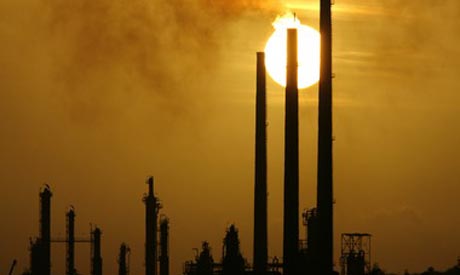
Struggling global economy could fit oil demand (Photo: Reuters)
The International Energy Agency may reduce its world oil demand forecast for 2012 this week due to a weaker outlook for the world economy, even though some evidence points to stronger consumption in the latter part of the year.
All three of the most closely watched monthly oil forecasts - from the U.S. government's Energy Information Administration, the IEA and producer group the Organization of the Petroleum Exporting Countries (OPEC) - are due for release this week.
Since their January forecasts, the International Monetary Fund (IMF) on 24 January reduced its estimate for world economic growth to 3.3 per cent from 4 per cent, saying the outlook had deteriorated in most regions.
That has a bearing on the Paris-based IEA's oil demand projections as the agency says it "relies extensively, but not exclusively" on IMF economic estimates in forecasting world demand.
The IEA's last monthly report on Jan. 18 said oil demand was falling for the first time since the global economic crisis of 2008-2009. The IEA reduced its 2012 demand growth forecast by 220,000 barrels per day (bpd) to 1.1 million bpd.
"I expect the IEA to cut 2012 demand by about 0.3 million bpd," said Olivier Jakob, oil analyst at Petromatrix in Zug, Switzerland. "Downward revisions need to come due to the IMF having lowered its world GDP forecast, and the IEA moves in line with the IMF numbers."
Yet there are signs of economic health rather than weakness. The United States created jobs at the fastest pace in nine months in January, a report on Friday showed, indicating stronger fuel demand in the top oil-consuming nation.
Jan Stuart, head of energy research at Credit Suisse, also thought a downward demand revision was on the cards, even though evidence was pointing the other way.
"I expect to see IEA and OPEC to revise down estimates for 2012 demand - wrongly. I think what they are going to do is take revised downward revisions of global GDP as their principal guide," he said.
"We think that more recent indicators and signals and data points show that in fact a global recovery is gaining pace and not de-accelerating."
The EIA issues its report on Tuesday, OPEC on Thursday and the IEA on Friday.
OPEC WORRIED ABOUT EUROPE
OPEC, whose members pump more than a third of the world's oil, left its demand figures virtually unchanged last month and saw the risk firmly to the downside.
A worsening of the euro zone debt crisis would reduce Europe's already slowing demand and could spill over to emerging economies, OPEC said. However, OPEC said the issue had so far had little effect on demand outside the region.
Speaking to Reuters in an interview last week in London, OPEC Secretary General Abdullah al-Badri said Europe remained a worry.
"We are really concerned about the EU sovereign debt crisis. If it is not solved...it will affect almost every country," he said. "Demand, the price and everything."
Last month's EIA report trimmed the forecast for world oil demand growth in 2012 by 120,000 bpd, or almost 9 per cent, to 1.27 million bpd. The EIA remains the most bullish on demand of the three agencies.
Some analysts do not expect to see substantial reductions to the IEA's demand outlook for this year and say estimates for the second half could even be increased.
"We do not expect to see any material downward revisions to annual oil demand growth for 2012," said Harry Tchilinguirian, an analyst at BNP Paribas who used to work for the IEA.
"Potentially, heating oil and gasoil demand in the first quarter may be trimmed further lower due to a mild start to the Northern hemisphere winter," he said.
"However, the better-than-expected trends in activity indicators like the ISM (U.S. Institute for Supply Management) and PMI (Purchasing Managers Index) in China and the United States could lead to upwards adjustments to oil demand forecasts for the second half of 2012."
Short link: